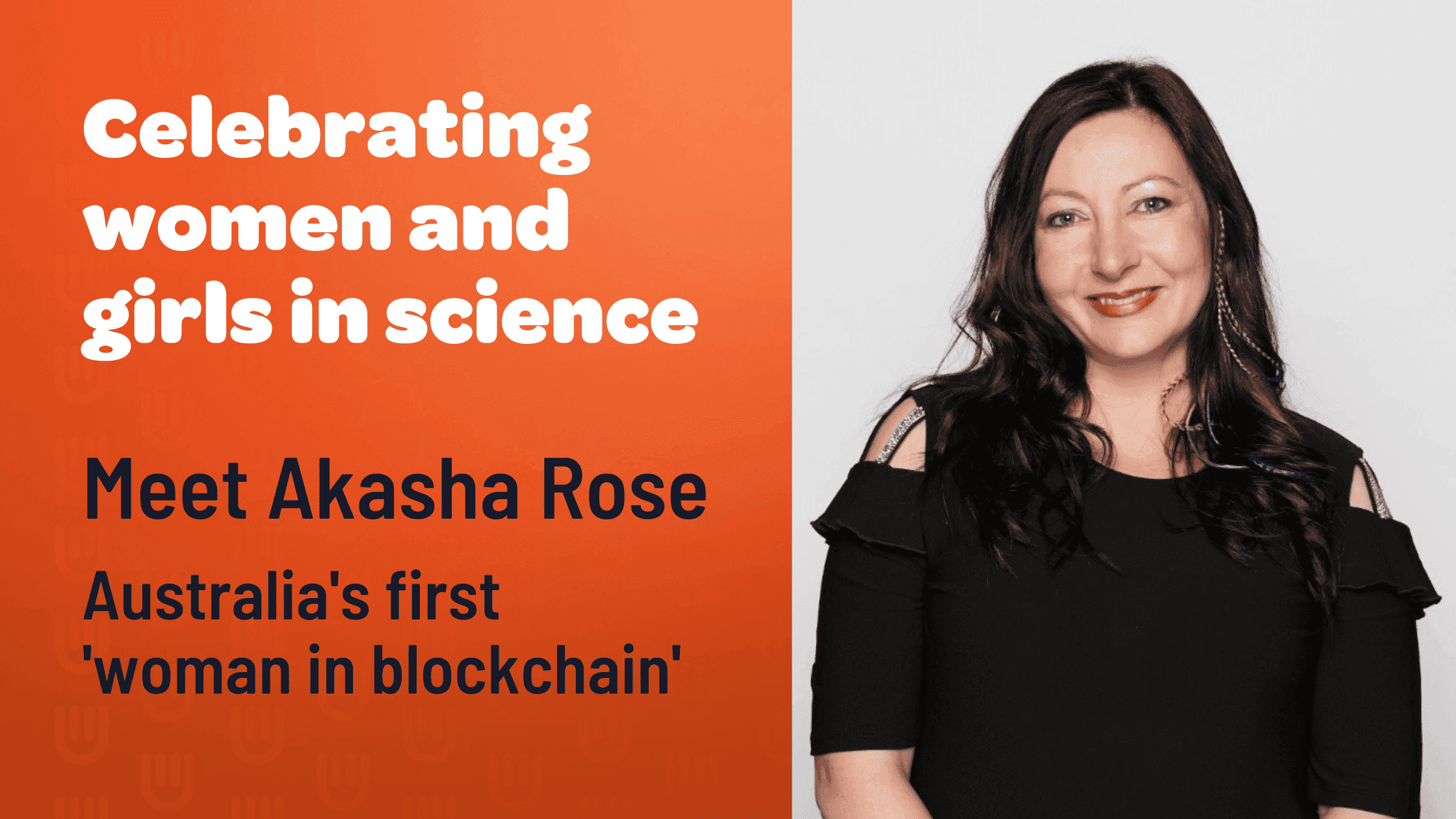Supporting International Day of Women and Girls in Science

Today (February 11) is The International Day of Women and Girls in Science. This day was declared by resolution of the United Nations General Assembly in 2015 to recognize the critical role women and girls play in science and technology.
As Unido’s own recognition of the contribution of women to blockchain technology, our team interviewed Akasha Rose, one of Australia's original "women in blockchain."
At a basic level, we can now send value to anyone anywhere in the world, using crypto, without intermediaries. But it will also allow the involvement of direct democracy for billions of people and the transparent governance of globally significant resources such as carbon credits.
Akasha, how did you get started in blockchain?
I knew about Bitcoin from around 2011. I was part of a startup building trust metrics to verify the trustworthiness of online content using social webs of trust. I didn't realize it then, but what we were building was essentially similar to a blockchain and web3, and would have been enhanced a lot by it but we were too early for our time. So, when I found out about blockchain I had a natural affinity for the possibilities of decentralization and cryptographically-secure ledgers that enabled the transmission of large amounts of transparent data.
I didn't buy my first small amount of crypto until 2017 - Stellar, and Doge - and quickly sold them when I realized my peers didn't share my enthusiasm for low-value gems. Big mistake! I deeply regretted my decision when that $100 in Stellar turned into $25,000 in the 2017 bull run and I think that amount of Doge would have been worth about $300,000 during the peak last year.
But that rollercoaster was enough of a taste for me to appreciate crypto was an exciting and rewarding place for women who, back in those days, were not investing in crypto in any large numbers.
And so that inspired me to create the online magazine "Miss Blockchain" that was live in 2017 and 2018 and featured a lot of crypto founders. Around the same time, I created one of Telegram's first women in blockchain groups, WIBI and that is still around today. It’s mostly comprised of the original members from 2017 so we are ancients in the crypto industry so to speak. It’s great to see how many of those original women have now found global success and are managing their own blockchain projects – DAOs, VC funds, exchanges, and NFT marketplaces.
What do you think is the future of blockchain technology?
Well, that's a very big question and personally, I see the future as limitless.
There are so many complex aspects of human society that blockchain will help us to scale in a fairer, more honest way. I see the main potential of blockchain as allowing us to foster complexity whilst maintaining trust. At a basic level, we can now send value to anyone anywhere in the world, using crypto, without intermediaries. But it will also allow the involvement of direct democracy for billions of people and the transparent governance of globally significant resources such as carbon credits. So blockchain enables enfranchisement of entire populations in never seen before ways and its true potential is in enabling decentralized distribution of wealth and resources to create an inclusive, free more peaceful world.
Do you see NFTs as having a lasting impact in the blockchain space?
At heart, I enjoy virtuosity and self-expression, and so I have a lot of synergy with the current NFT art movement.
When I was a student, I was subject to the same discouragement that I think a lot of young people used to be, where we were told we would never make money as an artist. Personally, I wanted to be a filmmaker. But with more life experience, I believe that if you do something that you love, and commit yourself fully to it, you will always be a success.
So, I get really excited when I see artists, photographers, filmmakers and musicians being financially recognized with the possibilities of NFTs. However, ultimately, I regard NFTs as a first evolution - and possibly a bubble, although nowhere near bursting. The real long-term potential of NFTs is in the democratization of real-world assets and identities - from affordable housing to regenerative development and subscription-based economies. NFTs right now are exciting and unknown territory, a bit like blockchain and Bitcoin were a decade ago.
Are cryptos like Bitcoin and Ethereum here to stay or will they be taken over by new digital assets?
That's a hard question to answer, because it really depends on time scales. Eventually, something will come along to replace Bitcoin but when? A decade? Two centuries? As it stands, Bitcoin is increasingly being seen as the gold standard to combat the risks of inflation in the fiat world.
We have all experienced on some level how hard it is to afford basics like food, let alone housing, in this current time of increasing inflation. People will always dabble in altcoins, but I believe that, at least for the next decade, the first coin most people will buy as they enter crypto will be Bitcoin - even in small amounts. As for Ethereum, we've really seen its limits over the last year and the gas costs have frustrated a lot of people wanting to get more involved in web3 using the benefits of Ethereum’s security and decentralization. Whether Ethereum stays pre-eminent will really depend on the implementation of its layer 2 technology over the next two years.
You can't really have a thriving blockchain and crypto ecosystem without secure wallets. And as more people, businesses and institutions invest, they will want the security of multi-signature wallets.
What role does corporate governance have to play in the blockchain space?
Well, you can't really have a thriving blockchain and crypto ecosystem without secure wallets. And as more people, businesses and institutions invest, they will want the security of multi-signature wallets. That was something I was thinking about way back in 2017 when I considered what happens even in the simple situation where two people in a relationship buy crypto together, or they share a business together and accept crypto for payment or it gets left in a will. There need to be better solutions to make crypto assets more durable and transferable across life transitions.
Too much crypto has gone missing with lost wallets. Stakehound, for example, lost millions of dollars belonging to its staking clients just last year due to a lost wallet seed. The industry can't afford to operate with single points of failure and they need to encourage institutional and small business investment.
So, I see the evolution of corporate governance standards as an essential part of crypto adoption for everyone, not just the big players. Most of all, we need to take small actions now that encourage the development of resilience across the entire crypto industry - only then will blockchain be valued as the reliable and decentralized ledger of all civic information that it truly represents.
I see the evolution of corporate governance standards as an essential part of crypto adoption for everyone, not just the big players. Most of all, we need to take small actions now that encourage the development of resilience across the entire crypto industry
Do you have any suggestions for supporting more women in blockchain technology?
Australian Senator Andrew Bragg recently released a report saying that there will be up to 250,000 new jobs in crypto in Australia in the near future.
The best thing you can do is let any women in your network who are looking for new job opportunities, or who want to pivot in their careers, that crypto and blockchain is a legitimate space.
I’ve had a lot of great opportunities in blockchain over the last few years, and have been very grateful for the skills that I developed in my early life – in digital transformation, community engagement, biodiversity, governance and startups. These have meant I can make an ongoing contribution to the meaningful transformation and regeneration of our social structures and enterprises today using blockchain and web3.
Crypto is a quickly transforming and evolving space, and whatever your skills and aspirations are, you will find your niche.
About Unido
Unido offers enterprise-level crypto custody solutions for SMEs, sophisticated corporations and institutions that want to leap into crypto, invest in DeFi and provide crypto access to their customers.
Our technology is based on a state-of-the-art fragmented private key-signing engine that enables enterprises to distribute transaction signing at the blockchain level. That, combined with our user-friendly dashboard and point-and-click business tools, provides enterprises with the level of corporate governance workflow and security they require to confidently do business on the blockchain.
Learn more:
- https://www.unido.us/
- https://t.me/unidogroup
- https://twitter.com/UnidoEP
- https://unidocore.medium.com/
Want to get involved in Unido?
- Join the waitlist to be a Unido EP Beta-tester
